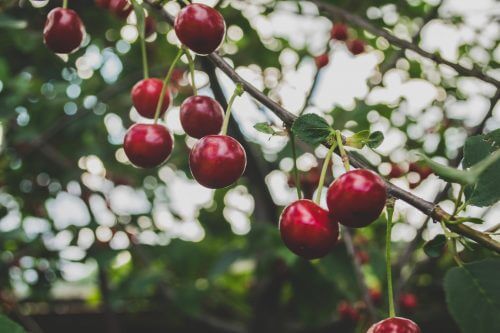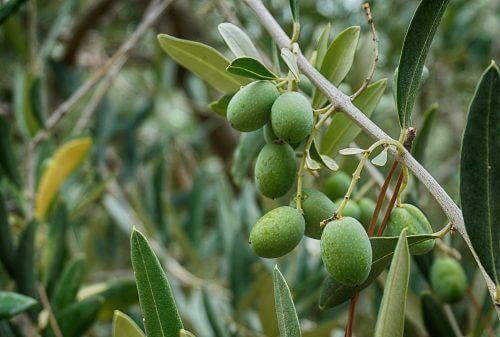Coffee, apples and even chocolate - the list of foods that may disappear from our plates due to the effects of climate change is getting longer. What can be done so that we are not left without comfort food?

By Racheli Vox, Angle, Science and Environment News Agency
The Irish playwright George Bernard Shaw once wrote that "there is no truer love than the love of food". Food is much more than just something that is essential to our existence - it is part of our emotion, culture, religion and pleasure. Whether we prefer sweet or salty, pasta or salad, beer or raspberry juice, we all have foods and drinks that we like, even a lot.
But the danger with things we love is that we tend to take them for granted. And in recent years, when temperatures around the world are rising and unpredictable weather events such as frost, frost and heavy rains are increasing - Our favorite foods are also affected by this, and may disappear from our plate before we feel it.
Dr. Noam Chechnovsky, a plant geneticist and one of my founders The Israeli Forum for Sustainable Nutrition, says that unlike plants that grow in greenhouses, where the growing environment is relatively precise, those that grow in the fields particularly sensitive to climate change. "They depend on the weather, the amount of rain and the humidity of the air and the soil, and since there are more extreme weather events - they get confused," he says. "So, for example, when winter starts later and in the middle of winter there are suddenly very hot days, it confuses the plant a lot. So you can see a decrease in the harvest, plant diseases, and pests that arrive earlier when it's hotter in the summer." In addition, Chechnovsky explains that the agricultural areas in the world are getting smaller and smaller. "Much of the area goes to urbanization, there is a lot of new road construction and construction. It can also be seen as good in Israel," he says.
Around the world, areas that have been used for agriculture for many years are undergoing significant changes. In some of these areas, it will not be possible to grow the crops that characterize them today. In some of them it will be possible to grow crops in the future if certain adjustments are made to the form of cultivation, which may cause an increase in prices or a decrease in output. It is also possible that areas that are not currently suitable for a certain type of agriculture will be suitable for it in the future, when temperatures will be higher. However, it should be remembered that the replacement of the existing agricultural areas with others may cause a lot of environmental damage, for example due to Deforestation to be carried out to qualify the areas for agriculture.
Here are five foods that are greatly affected and may even disappear completely due to climate change:
chocolate

Sometimes it seems that there is no problem in the world that chocolate cannot solve. Whether sweet or bitter, white or filled with rice crackers, solid or liquid, chocolate has excited human taste buds since the days of the Mayan civilization. However, even the best chocolate cannot prevent this problem.
study Held in Ghana and the Ivory Coast, the world's largest chocolate exporters, examined the impact of climate change on the cultivation of cocoa beans, from which chocolate is produced. The research found that in many areas where chocolate is grown today, it will no longer be possible to grow it in the future, because the temperatures will be too high: the heat will lead to the evaporation of water from the cocoa trees, which will cause the productivity of the trees to decrease. The chocolate company "Mars", the manufacturer of the brands Mars, Snickers, Twix and many others, even Rented Meteorologistswhose job it is to investigate the effect of the changing climate on the raw materials for the production of chocolate and to try and reduce the damage that will be caused to them. Even if chocolate does not completely disappear from the world, its price may well rise significantly due to its shortage.
coffee
Chocolate is not the only comforting drink affected by climate change. Other drinks that are affected are הwine, הtea, and that drink that many cannot imagine their life (or at least their morning) without: coffee. In recent years, the so-called fungus "Coffee rust" ("Coffee rust") has become widespread throughout the world. Scientists believe that the high temperatures allow the fungus to spread quickly, far, and to altitudes where the climate was previously too cold for it. The fungus has already caused losses of above Billion Dollarר due to loss of crops. It does not act alone: the heat also causesCulture של Pests, and these harm the production of coffee in East Africa.
Beyond that, the rise in temperatures and changes in rainfall patterns also affect the coffee plant. If the current situation continues, the area in the world suitable for growing coffee is expected be reduced ב-50 Percent By 2050, it will be necessary to grow coffee in areas farther from the equator, and at higher altitudes. Such a move will increase the risk of damage to forests and open areas that are currently not cultivated for the purpose of preparing the land for agriculture.
Apples
The juicy and refreshing apple is one of the most popular fruits. In fact, every week the Israeli consumer buys כ-730 tone Apples. The origin of apples is in Central Asia, in areas where the winters are cold. In order for their fruits to develop properly, the apples need during their growth a certain amount of hours of moderate cold: a temperature that is lower than 7 degrees Celsius but higher than zero. However, global warming may reduce the amount of time these conditions exist, and so Hurt yielding The apples. Already today,their taste and their texture of apples are beginning to change due to climate change.
Cherries

Another fruit that needs cold periods in order to develop properly is the cherry. Rising temperatures may cause trees to bloom later and produce less fruit. In such a situation, a basket of sweet cherries, cherry pie for dessert, cherry jam on the bread and also the cherry in the whipped cream may become a rare commodity.
Extreme weather events that happened in recent years caused a lot of damage to cherries in the world. In 2012 he was injured 90 Percent crop the cherries the pickles של State Michigan – the country responsible for 75 percent of the yield of this species in the United States. That year, the month of March was particularly hot, which caused the trees to wake up from their "winter hibernation" early. However, the weather soon changed again, the cold returned, and the young buds that had time to appear were severely damaged by it. The losses caused to farmers in Michigan that year from the loss of fruit crops (cherries, apples, grapes and peaches) were estimated at 210 million dollars.
olives
The instability in the weather and the extreme weather events are also very damaging to the olive, one of the foods most associated with the countries of the Mediterranean, rural and as a source of oil, which is also known to be one of the seven species in which the Land of Israel was praised. On the one hand, climate hot and dry May cause the fruits to dry out, a problem that many times cannot be solved by increasing irrigation due to unavailability of water and fear of damage to the quality of the olive oil. On the other hand, abnormal amounts of rain cause the olive fly, a species of fruit fly, to multiply rapidly. The female flies lay eggs inside the olives, and the worms that hatch from them eat the fruit from the inside.frost on time No expected It can also have a negative effect in different ways on the olives, especially on the young fruits. According to estimates, already this year Spain, the largest producer of olives in the world, will register a decrease of At least 10 percent in output compared to last year. In Italy, the yield of olives is expected to be 20 percent lower than the average of the previous decade.

Cultivate new varieties
Why is the food we grow so sensitive to the effects of climate change? "We grow a very small number of varieties of each type of crop," explains Dr. Hagit Ulanovski, an expert in health and environmental risk management and director of the Israeli Forum for Sustainable Nutrition. For example, most of the bananas on the world market belong to the same group of varieties, named "Cavendish". "The agricultural varieties are very adapted to the environmental conditions - and as these change, they become more vulnerable. A wide variety of varieties is needed in order to create resistance".
According to Ulanovski, apart from the damage to the crop itself, the weather damage may force the farmers to use larger amounts of pesticides. "If the plant is more sensitive, then it is more subject to attacks and therefore needs more pesticide, which is of course a very undesirable situation," she says.
Another possible danger following the decrease in crop volumes is the cessation of imports of basic products to Israel. "Israel depends on the import of many crops, such as grains and legumes," Olanovsky explains. So, for example, most of the wheat we consume is imported from Russia and Ukraine. "As soon as there is a significant shortage, it could cause governments around the world to issue instructions to stop exporting agricultural produce that is valuable to the country itself, which could lead to the fact that one day Israel will not be able to buy wheat for bread, for example," she says. That is, if there is a shortage of a certain crop, it is quite possible that countries where it is grown will prefer to keep it for themselves, and not sell it to other countries, such as Israel - and thus it will not reach us.
So what can be done to deal with the situation? "From an agricultural point of view, there are several approaches," Chechnovsky says. "One is to cultivate new varieties that will be more resistant to the extremes of the weather." Such a process, of course, takes a long time. "The second is to develop agricultural technological methods, such as more advanced irrigation methods, to, for example, provide water when there is a drought in the middle of winter, methods of controlling the growing area, new fertilizers, and environmentally friendly pesticides that are effective against new pests that appear due to the higher temperatures."
And what about us, the consumers? According to Ulanovsky, we must adapt ourselves to the new situation. "Let's prepare for it, let's eat a greater variety of vegetables and fruits so that we don't depend on one particular vegetable," says Ulanovski. "We eat an Israeli salad of cucumber and tomato, but cabbage salad is also an excellent vegetable salad. If there is a shortage of cucumber - we will eat another vegetable. You don't have to buy a tomato for NIS 18 per kilo."

2 תגובות
Humanity is also shrinking. A changing climate due to a change in the angle of inclination and due to solar eclipses,
Learn to stop getting dirty in addition to that. And shortly we will also learn about Bethel Migdal in Babylon and described in the book
At the beginning of chapter XNUMX it will be defined as a psychiatric illness and treated accordingly.
Interesting and sad but:
Again and again the accuracy in the lists of the "Agency" is lacking, for example:
It says that: "Ghana and the Ivory Coast are the largest chocolate exporters in the world"
Not true ! They extract cocoa beans, not chocolate, there is a difference,
Coffee bushes need basic soil, low temperature range
and heavy rain at regular times,
All this does not exist in "regions farther from the equator",
And again there is a lot of confusion in the concepts of sorting between: species, variety or type,
It's a shame that the writers of interesting and important material are not careful!
On the margins of things, the importance of Israeli agriculture comes up again
And it is fitting that the responsible parties are the Ministers of Agriculture and Finance as well as the Water Authority
Stop harassing farmers and start supporting them...